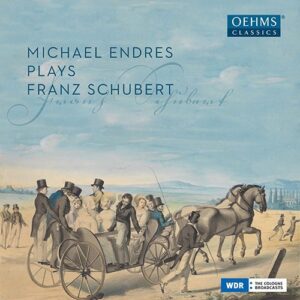Michael Endres’ Schubert Impromptus come close to reference standards for technical refinement, perceptive musicianship, and idiomatic sense of style in a splendidly engineered recording that originates from Cologne Radio. Unlike Artur Schnabel’s drama and rhetoric in the D. 899’s opening C minor piece, Endres largely adheres to a brisk steady tempo, using rubato with the utmost discretion, and makes interpretive points through articulation, color, and balance.
One telling example is how the persistent left-hand triplets assiduously evolve from murmuring background figurations into foreground accomplices. Endres’ rapid scales in the E-flat rival Perahia and Pires for rippling elegance, while he observes the central section’s “ben marcato” directive without lunging at the music, and gauges the final accelerando to perfection. While Endres’ tempo for the G-flat is slightly under my preferred alla breve paradigm, the pianist’s absolute textural control and fastidious attention to rhythmic values and dynamic indications keeps the music afloat and moving forward. His subtle give and take throughout the final A-flat Impromptu prevents the cascading right-hand patterns from sounding the least mechanical or routine.
D. 935’s Impromptus similarly operate on a high level. Again, Endres manages to give specific character to the opening F minor’s contrasting sections while maintainng a unifying metric trajectory (metronomic, never). Although No. 2 in A-flat is marked “sempre legato”, Endres wisely varies his touch, bringing a welcome and expressively relevant diamond edge to the accented chords.
The B-flat Theme and Variations Impromptu receives a lovely, flexible reading. My only half-quibble concerns Endres holding back in Variation Five, and not allowing the 16th-note triplets to take wing, which one still can do at a pianissimo level (Horowitz’s glorious 1985 DG recording, for example). I also prefer more ferocity and drive in the final piece, but Endres’ smaller-scaled, slightly clipped conception nonetheless brings out the music’s scherzando qualities.
Endres resists the fashionable temptation to probe the C minor Allegretto and the B minor Hungarian Melody for hidden profundities, and also plays the A major Andante and the Kupelwieser Waltz with simplicity and directness. Among modern recordings, Endres’ Schubert Impromptus take a well-deserved place alongside Pires, Lupu, and Perahia, along with a live version from 2000 by Konstantin Lifschitz on Palexa that may be hard to source, yet is worth seeking out.
































